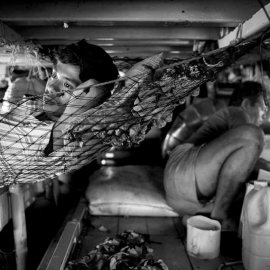The Outlaw Ocean, Part Four
-
English
-
ListenPause
[intro music] Welcome to World Ocean Radio… I’m Peter Neill, Director of the World Ocean Observatory. This week we conclude our four-part excerpt from “The Outlaw Ocean” by Ian Urbina, Investigative Reporter for the NY Times and W2O Advisor. After 4 years of reporting across the world on vivid and corrupt aspects of the ocean, what comes of it? What conclusions can be made? How can we apply what is to be learned from this remarkable adventure? Urbina writes, “Impunity is the norm at sea not just because of the lack of enforcement but also due to the cast of characters out there who, with questionable credentials and motives, are left to take up the slack. Bureaucrats rather than investigators conduct what rare inspections actually occur on vessels suspected of environmental or labor abuses. Vigilantes and private mercenaries, as much as police or navy officers, patrol the high seas and pursue scofflaws on the floating armories or in the chases. What rules apply in international waters have been crafted over the years more by diplomats and the fishing and shipping industry than by lawmakers or labor lawyers. This had made commercial secrecy a higher priority than crime prevention.” “Mostly I explored the dark underbelly of this offshore frontier, places where the worst instincts of our human species thrives and flourishes. But I also witnessed unparalleled beauty and true marvel. I met bizarre, sometimes heroic characters in a setting that drowned the senses, a world with brighter sun, louder waves, and stronger wind than I previously knew to exist, as if I’d been parachuted into one of those fanciful maps the medieval cartographers dreamed up.” “One particular afternoon comes to mind. I stood on the front deck of a ship in the South Atlantic Ocean. Under an apricot sunset, I watched a winged fish fly through the air for hundreds of feet. Moments later, several birds dove into the ocean and swam deep underwater equally as far. That night was cloudless, the sky was big as it ever gets. A night, shooting stars left white slashes like chalk lines on a blackboard. The most dazzling streaks, though, were not in the sky but underwater. As fish darted through certain areas, the sea was slashed with glowing blue lines, the result of a mesmerizing defense mechanism of bioluminescent plankton that allows them to produce the light. “ “What grabbed me that day was how much of this place is magically upside down: fish in the air, birds underwater, white streaks above us, blue below. Part of its beauty is its exotic unpredictability. The wonder of it all is magnetic, and each time I returned to land, I felt an intense longing for this place, homesick for a location not my home, despite the suffering I’d seen there.” “But there was something else that…transcended both the darkness and the beauty offshore. I thought back on the black expanse that swallowed that small airplane in Palau or how that same sort of vastness had long provided an excuse for dumping waste into the world’s oceans. I thought about the crushing boredom at sea and the distinct way it tortured seafarers on abandoned vessels and armed guards on the floating weapons depots. I thought about the silence that fed gruffness on so many ships and how it bred resignation among the raped, robbed, and drowned men of the Oyang fleet. While some of those men paid a heavy price for breaking this silence, I also recalled the regard reaped by the magic-pipe whistle-blower who spoke up. “ “The snapshots seemed to demonstrate that the outlaw ocean and the ships that traverse it are defined not just by the people who work these waters but also by intangible forces like silence, boredom, and vastness. I’d go a step further: the ocean is outlaw not because it is inherently good or bad but because it is a void, like the silence is to sound or boredom is to activity. While we have for centuries embraced and touted the life that springs from these waters, we have tended to ignore its role as a refuge of depravity. But the outlaw ocean is real, and has been for centuries, and until we reckon with that fact, we can forget about ever taming or protecting this frontier.” We will discuss these issues, and more, in future editions of World Ocean Radio. [outro music]
This week on World Ocean Radio we conclude our four-part series devoted to "The Outlaw Ocean", a new book by award-winning New York Times investigative journalist Ian Urbina. In this episode we ask, "After four years of reporting across the world on vivid and corrupt aspects of the ocean, what comes next? What conclusions can be made? How can we apply what is to be learned from this remarkable adventure?"
Do you prefer the written word? Head on over to Medium.com/@TheW2O.
About World Ocean Radio
World Ocean Radio is a weekly series of five-minute audio essays available for syndicated use at no cost by college and community radio stations worldwide. Peter Neill, Director of the World Ocean Observatory and host of World Ocean Radio, provides coverage of a broad spectrum of ocean issues from science and education to advocacy and exemplary projects.
Image credit:
Adam Dean
The Outlaw Ocean
Crime and Survival in the Last Untamed Frontier
by Ian Urbina
Order hardback, ebook and audio download from:
- Hive
- Waterstones
- Amazon
THE OUTLAW OCEAN is a riveting, adrenalin-fueled tour of a vast, lawless and rampantly criminal world that few have ever seen: the high seas.
- Login to post comments



